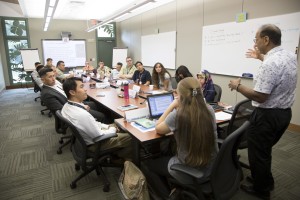
Seminar leader adds his experience to the group discussion.
Broadening their understanding of the complex Asia-Pacific region, 150 security practitioners completed the Asia-Pacific Orientation Course today in Honolulu.
Conducted Jan 25 to 29 at the Daniel K. Inouye Asia-Pacific Center for Security Studies, the course educated 150 participants on the myriad factors that impact the region’s security environment. Primarily mid-level military officers and their civilian equivalents take part in discussions centered on socio-economic, political, defense, health and environmental issues.
“A lot of people have worked in Asia for a long time without a formal introduction to the region,” said course manager Dr. Jeffrey Reeves. “”We provide the strategic (perspective) so they can see how what they do on a daily basis fits into the big picture. Hopefully, they will be more effective in regional engagement and executing U.S. policy.”
DKI APCSS professor Dr. Christopher Snedden launched the first of the course’s 13 plenary discussions. He addressed the region’s geopolitical landscape, discussing major security challenges and trends driven by history, politics, and culture. Other plenary titles included “Security Dynamics in South Asia” by Dr. Saira Yamin and “Cybersecurity in the Asia-Pacific” by Dr. Lora Saalman. Fellows supplemented their newly gained knowledge through daily seminar sessions, which allowed them to share their personal perspectives with peers.
APOC 16-1 participant Cynthia Burney, community support program manager with Pacific Air Forces at Hickam Air Force Base, Hawaii, said she was fascinated by discussions in her seminar where she had an opportunity to interact with representatives of different branches of the U.S. military.
“I had a general idea about what the different branches of the DoD do, but to hear the specifics and the roles they play to ensure peace and provide humanitarian efforts.it’s great to see what my colleagues are doing; it’s fascinating. I can visualize that, and what I see in my seminar is like a meeting of the U.S. Joint Chiefs of Staff. I feel energized, and I am appreciative of the opportunity to be in APOC.”
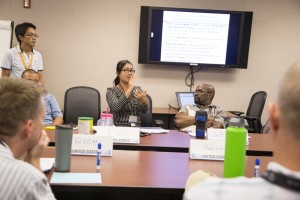
APOC 16-1 Fellow using sign language to participate in the seminar group discussion.
Sally Ziolkowski of the Federal Emergency Management Agency Region 9 located in Oakland, CA appreciated the opportunity to be selected for the APOC and interact with her military colleagues. “I’ve been so impressed by the talent and the intellect in the well-educated, trained military representatives … and by the type of work they do to support developmental activities throughout the Pacific…” “I’ve been fortunate to have traveled to some of these countries, but it’s different when it all comes together in a form where it’s organized by some excellent professionals, subject matter experts on economics, current climate of politics, larger expansionism, and historical perspectives of countries of South and Southeast Asia and their perspectives on how they should be a participant on the world stage.”
U.S. Fellow Alan Aoki, a research analyst with the Center for Excellence in Disaster Management and Humanitarian Assistance located in Hawaii, said, “It’s called the Asia-Pacific Orientation course, but I would argue that it goes beyond being an orientation course, even for somebody who’s familiar with the region. I am looking at it through the humanitarian assistance and disaster relief lens…there is so much more that I need to keep thinking about and reconsider (in) my work. APOC’s (approach to) multi-layered and complex issues are going to affect the way I look at my own work.”
The overarching theme of this week’s APOC continued that of three 2015 iterations: Comprehensive Engagement. The concept focuses on creating linkages between American security practitioners and their counterparts in the region while providing a basis for mutual understanding. According to Reeves, a big part of this effort is equipping Fellows to think about how others in the region perceive certain issues.
Among those taking part in this perspective-shaping course was the Center’s first cohort of hearing-impaired Fellows with four in attendance. They joined Fellows from nine locations: Australia, Brunei, Canada, Japan, Republic of Korea, New Zealand, Singapore, Taiwan and the United States.
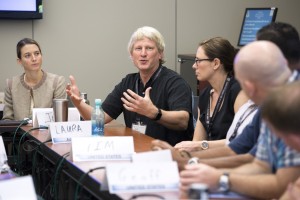
Seminar group discusses women in the military.
APOC is one of six formal courses at DKI APCSS. The center is a Department of Defense institute that addresses regional and global security issues. Military and civilian representatives, most from the United States and Asia-Pacific nations, participate in a comprehensive program of executive education, professional exchanges and outreach events, both in Hawaii and throughout the Asia-Pacific region.
The Center supports U.S. Pacific Command by developing and sustaining relationships among security practitioners and national security establishments throughout the region. APCSS’ mission is to build capacities and communities of interest by educating, connecting and empowering security practitioners to advance Asia-Pacific security. It is one of the Department of Defense’s five regional security studies centers.
Since opening in 1995, more than 9,700 alumni representing over 122 countries and territories have attended APCSS courses and workshops.
-END-


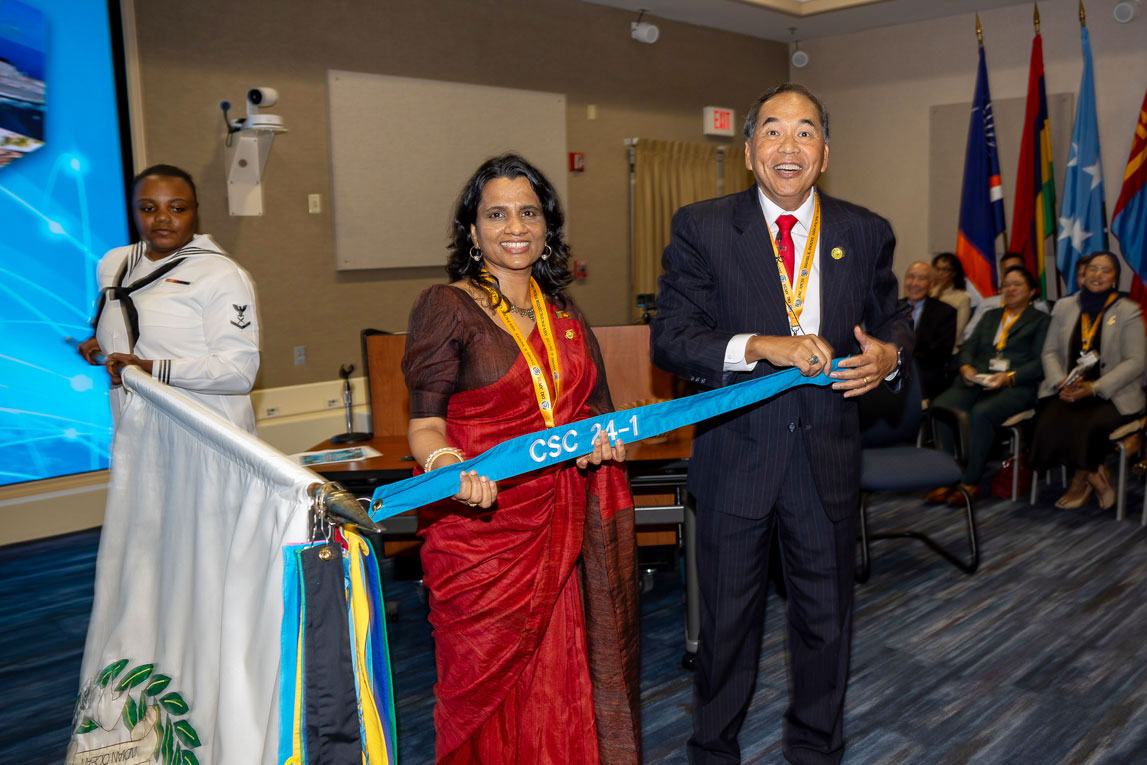
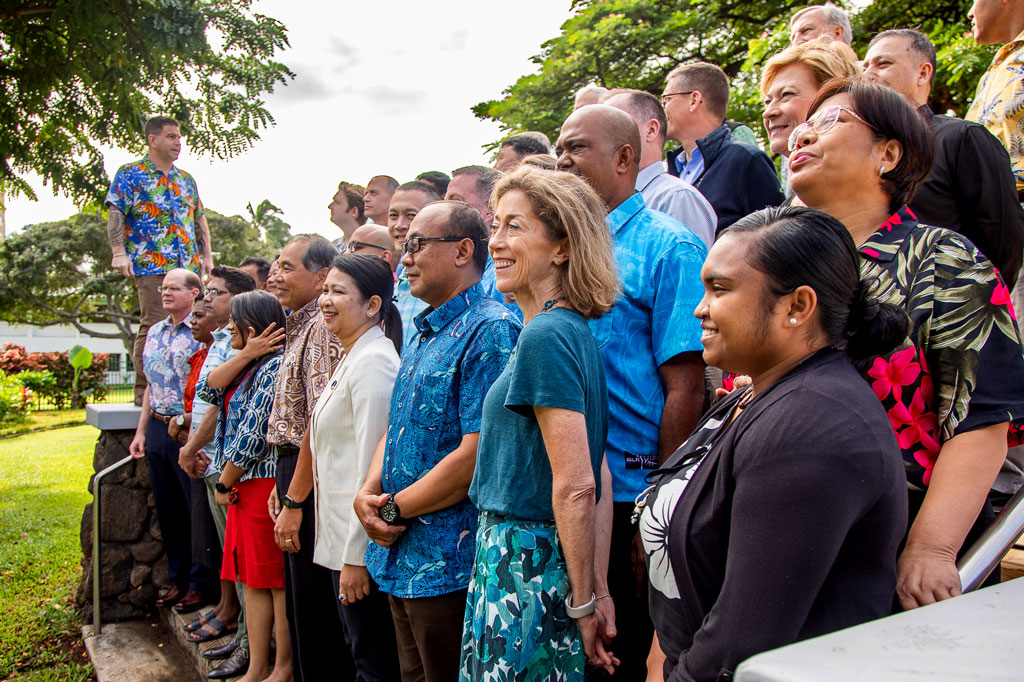
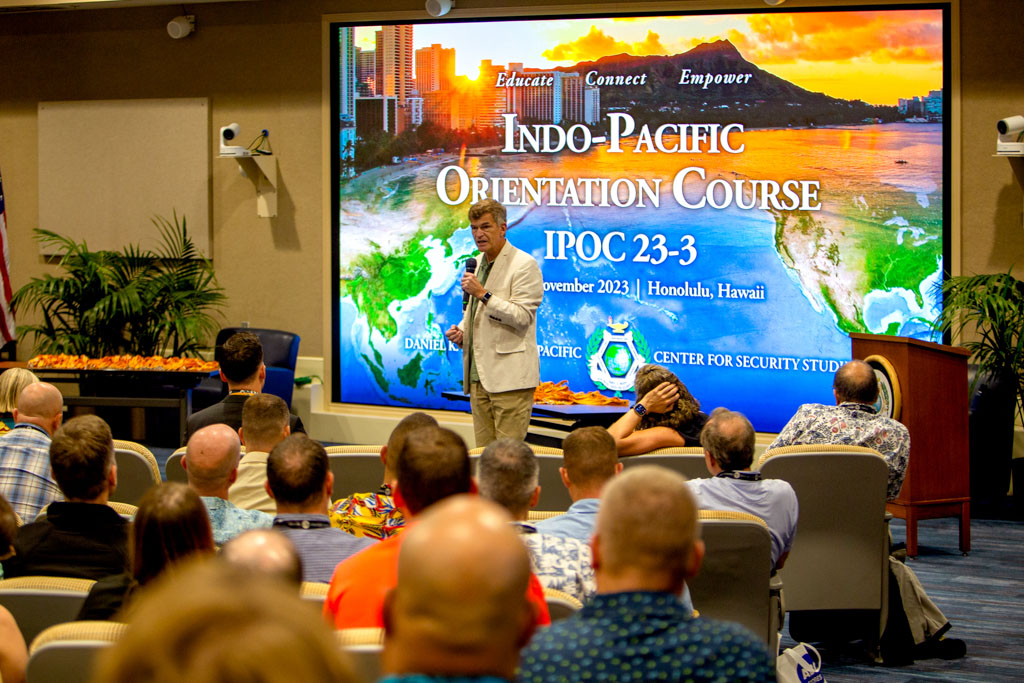




Leave A Comment